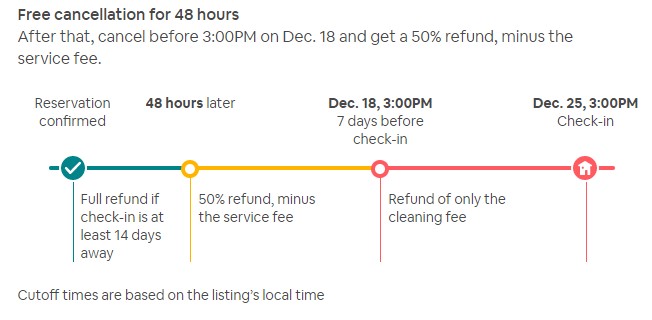With nearly 150,000,000 users and listings available in more than 65,000 cities, Airbnb has secured a profitable share of the travel industry. When you rent an apartment with Airbnb rather than a hotel room, you often get more space at a lower cost, especially when travelling with a larger group in need of multiple bedrooms. Furthermore, you can find listings in more remote neighbourhoods tucked away from the touristed areas, which is not always an option with hotels.

But as with any holiday rental, you might be disappointed if things aren’t what you expect. Or worse, you could end up paying extra fees if the host accuses you of damaging their space.
Let’s see what you can do to avoid nasty surprises, and how to deal with issues that come up.
Pay attention to all the details when you’re booking
Use the filters
Save yourself time at the beginning of your search by selecting all the applicable filters, not just the dates and number of guests. The “Type of place” filter is important. If you don’t want to share an apartment with the owner or other travellers, select “Entire place.” This will eliminate a fair amount of irrelevant results from the get-go. You should also adjust the maximum price, the number of beds and bedrooms, the neighbourhood you want to stay in, and the amenities you wish to have.
Look at all the photos
Make sure you review all the photos (in detail!) to ensure the description of the place is accurate. Sometimes, a convertible sofa will be listed as a bedroom, or a TV will be listed under the amenities but won’t appear in the photos. When in doubt, message the host for confirmation. Usually, when I see a listing with no pictures, I go straight to the next one.
Look at the map
See the listing’s location on the map at the bottom of the description page. Although the host won’t communicate the exact address until your booking is confirmed, you’ll get an idea of the area in which it’s located. Take a closer look at the area on Google Maps to see the actual distance between the rental place and other neighbourhoods or attractions. Also, check online if there’s a lot of bars on the street. If you want to explore the nightlife, then great! If you’d rather go to bed early, maybe this isn’t the best place for your vacation.
Read the reviews
The reviews are left by fellow travellers like you. They’re here to help. Read them in detail to make sure you get the full picture. Sometimes, a listing will have an aggregate score of 5 stars, but the most recent reviews hint that things have gone downhill. Also, it’s not uncommon for reviewers to leave great scores while also providing suggestions in the detailed review (e.g. “mattress was too firm,” “woke up early every morning because there are no blinds on the windows,” etc.). These are the sorts of things you’ll want to know. Finally, avoid places with no reviews. I know, everyone needs to start somewhere. But do you really want to take a chance? You can also filter your search to only show Superhosts, who are experienced hosts with excellent reviews, but you should still read their reviews in detail.
Look at the rules
Check the housing rules (can you bring a pet, have friends over, etc.) and the cancellation rules. I tend to pick hosts that have flexible cancellation rules. This way, if something comes up, I can cancel and get most of my money back.

You should also look at how often the host has cancelled bookings in the past to gauge their reliability. This information is displayed with the reviews.
Check-in time
Pay attention to the check-in and check-out times. It’s never nice to wake up early on your last day of vacation just so you can leave the premises on time.
Also, if you think you’ll be arriving before check-in time, message your host as soon as possible. They’ll likely be accommodating if possible, but sometimes a fee will be charged if it disrupts the schedule to prepare your suite in advance.
Maximize your budget
The service and cleaning fees will vary from place to place. Play with the price range filter by going a few dollars above your budget. Nicer places will come up in your search. If you see one that charges low cleaning fees, it might be worth it. In the end, you might spend a little bit more than what you originally intended, but you’ll end up with nicer accommodations, and avoid wasting money on higher service fees for an average apartment.
Also, a lot of listings offer weekly discounts for extended stays. So, if you were thinking of staying six nights in one place that offers a discount for weekly stays, it might be worth it to reconsider your itinerary and stay the extra night. You could save up to 20% on the total price!
If you’re willing to sacrifice a bit of space and privacy, another way to save money is to make good use of the sofa bed. Rather than choosing a rental with separate bedrooms for everyone in your group, you’ll pay less if someone doesn’t mind sleeping in the living room.
If one of the amenities isn’t working, tell your host right away. They may offer you a discount for your next stay. I once stayed at a place in the winter where the heated floor tiles weren’t working. To apologize, the host gave us a 25% discount for our next stay at their place.
Book early
This rule applies to all areas of travel. The longer you wait, the fewer listings you’ll have available. And if you wait too long, you may be left with the places that no one wants to rent, or that don’t fit your budget.

What to do if the host cancels
Airbnb has put measures in place to discourage hosts from cancelling your reservation. They have to pay penalty fees based on how long in advance they cancel, and the cancellation is shown in their reviews, potentially dissuading future travellers from renting.
Even though it’s not in the host’s best interest to cancel, these things can happen. If the cancellation is close to your travel dates, you will get a full refund, and may even be eligible for an upgrade. On our last trip to Japan, our host had to cancel 8 weeks before our trip. We got a full refund and a credit worth 20% of the cost of the initial booking. This really helped, since the listings that were left at this point were more expensive. Extra compensation isn’t guaranteed, though, so make sure you ask for it; you’ve got nothing to lose.
A bit of preemptive planning will help a great deal. Create a wish list when you start your research (click the save button with a heart logo). If your booking is cancelled, you can go through the list of saved options instead of doing a new search. Chances are, a lot of your favourites will be booked — but all you need is one free one.
What to do if the host accuses you of damages
We rented a house with our friends in Mexico last year. One of us broke a pitcher by accident. We told the host right away and offered to pay for the pitcher. This should have been the end of the story. But one week later, we got notified that a claim on our security deposit had been made. Our host claimed that we damaged the carpet, the marble countertop, and a speaker — none of which was true! We battled through Airbnb’s Resolution Centre, but despite our perfect 5-star record, we lost the dispute. Since we couldn’t submit proof that we didn’t cause any of the damages, we had to pay the $600 USD fine that was asked of us. Fortunately, there were 7 of us to split the bill, making it easier to swallow.
I’ve read lots of stories like this online, in which guests are wrongly accused of breaking windows or damaging furniture.
If this happens to you, follow all the guidelines of the Resolution Centre, and communicate rationally and politely. A host has 14 days from the date you check out to submit a claim. They aren’t necessarily trying to rip you off; maybe the previous guests caused the damage, and the cleaning staff didn’t notice it. It’s also helpful to do some research online to see how other people dealt with it, and what came out of it.

It’s hard to prove who’s in the right in a situation like this. Based on what I’ve read online, Airbnb is more likely to side with the host. This is why it’s very important to take a good look at the rental when you first check in. Since the incident in Mexico, we’ve been documenting everything upon check-in, phone in hand. Sure, it’s not a fun way to start a trip, and you can’t possibly document every single piece of silverware in the kitchen, but you should at least check things like electronics, appliances, furniture, rugs, etc. It only takes a few minutes, and you could be thankful you did later.
If you notice any major damage, take a photo and send it to the host immediately. This will make it harder for them to accuse you later. On our last trip to Italy, we noticed when we checked in that a chair on the balcony was broken. We reported it right away, so they knew the damages weren’t our fault.
Do you have your own tips for making the most of a short-term rental? Share them in the comments below.
Enjoy your stay!
Thomas Boudel Tan
